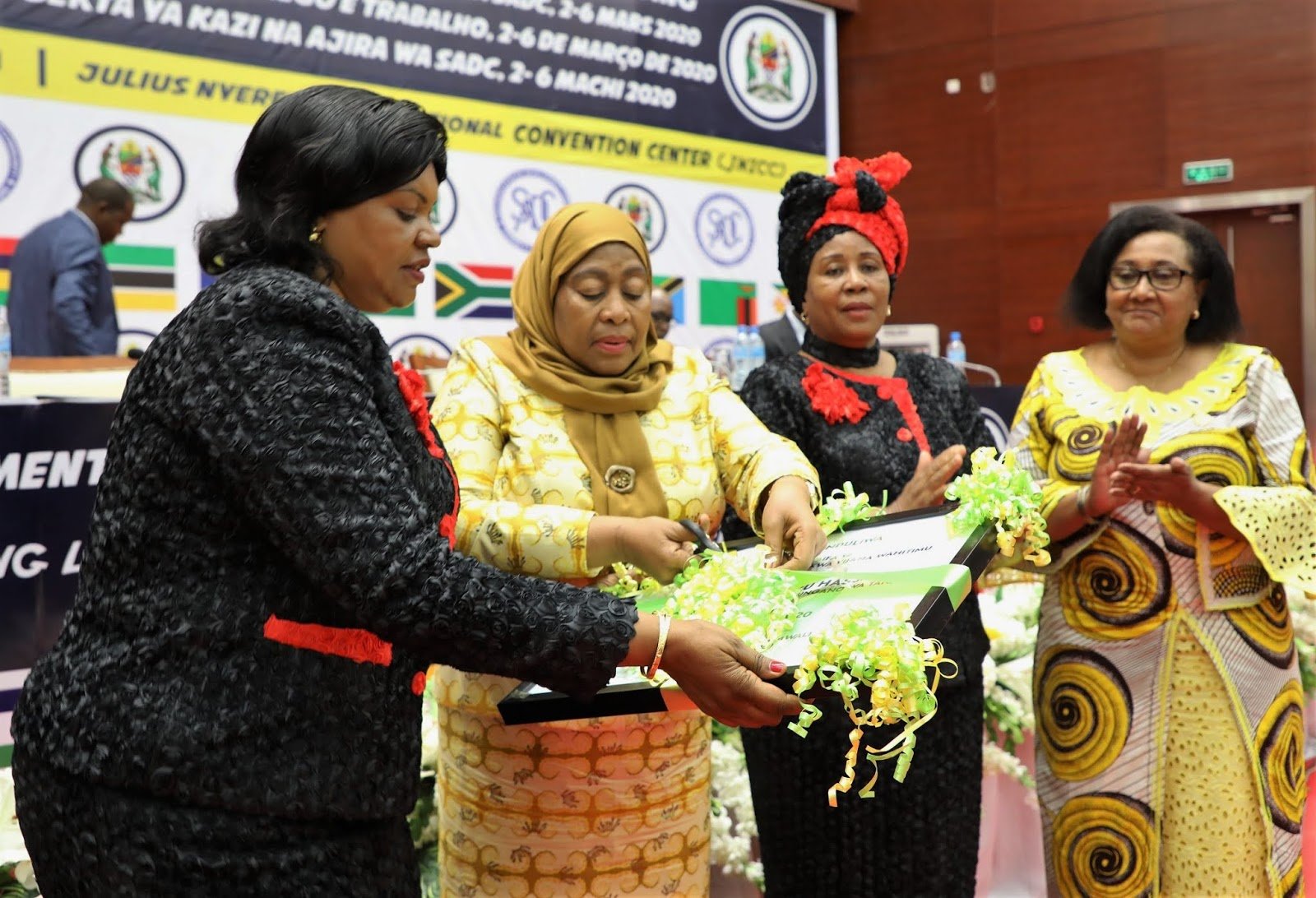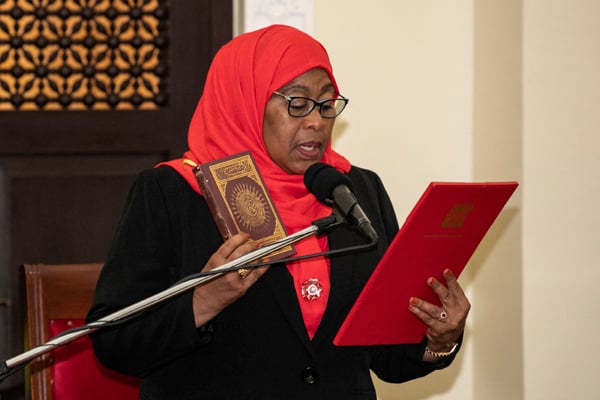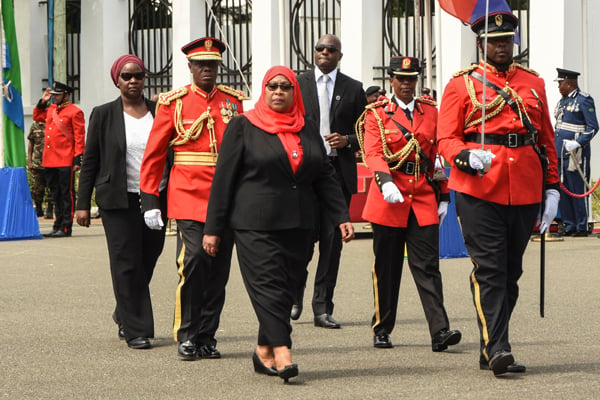Prime
Samia redefining women roles in Tanzania

President Samia Suluhu Hassan is flanked by the Minister of State in the President’s Office [Public Services Management and Good Governance], Ms Jenista Mhagama (left), and the minister for Foreign Affairs and East African Cooperation, Dr Stergomena Tax (right), in this file photo. President Hassan has appointed women in key ministries. PHOTO | NMG
What you need to know:
- President Hassan’s rise to power also provides a role model for young girls and women who may have previously felt excluded from socioeconomic processes
The swearing-in of Tanzania’s first female president on March 19, 2021, was a significant milestone for the country’s gender mainstreaming agenda. Samia Suluhu Hassan’s ascendancy to the presidency sent a strong statement about the leadership potential of women and the importance of giving them equal opportunity to effectively contribute to the development of the nation.
Ms Hassan’s rise to power also provides a role model for young girls and women who may have previously felt excluded from the social, political and economic process.
In a community where there are still differences in access to fundamental rights between men and women, President Hassan had to hit the ground running to show the world that being born a girl or a boy had nothing to do with someone’s leadership acumen.
And that is precisely what she meant when she told the BBC in an August 2021 interview that she would embark on a leadership style that would tell the world that women make better presidents.
“Some don’t believe that women can be better presidents, and we are here to show them... Even some in my government dismissed me at first as just another woman, but they soon accepted my leadership,” President Samia is quoted as having said.
“But this is not just in Africa; even in America, [Hillary] Clinton reached a place where we thought she was going to be the president, but she lost the election,” she added.
In an apparent desire to show the world that women can effectively lead, President Hassan has more than once appointed competent women to lead what are considered key ministries of the government.
For example, the appointment of a woman as the Minister of Health can help to ensure that women’s health needs are prioritised and that policies and programmes are developed with a gender-sensitive approach.
That position is currently held by Ms Ummy Mwalimu, who, among other things, spearheaded President Samia’s ‘health first’ approach towards the handling of Covid-19 and the roll-out of vaccines across Tanzania.
President Hassan’s approach to handling the pandemic has been vastly different from her predecessor’s. Her data-driven approach to testing, commitment to vaccine distribution, and collaboration with regional and international partners have contributed to Tanzania’s efforts to curb the spread of Covid-19, and Ms Mwalimu has played her role effectively in that area.
Presently, President Hassan’s cabinet consists of nine women.
With economic diplomacy at the top of the President’s agenda, the person manning the Foreign Affairs and East African Cooperation docket is Dr Stergomena Tax. Apart from strengthening East African Community (EAC) integration, Tanzania has also improved relations with other countries in the Southern African Development Community (SADC), as well as Europe, Asia and America.
Before taking the position, Dr Tax was the 6th Sadc executive secretary and the first woman to hold the docket.
President Hassan has also put the ministry of Land, Housing, and Human Settlements Development under the custody of Dr Angelina Mabula, and that of Industry and Trade under Dr Ashatu Kijaji.
President Samia Suluhu Hassan’s approach to increasing investment, trade, and manufacturing in Tanzania has been proactive and business-friendly.
Dr Kijaji has been a key figure in translating President’s policies and initiatives to streamline the investment process, improve infrastructure, promote local entrepreneurship, and attract foreign investors. She has created a favourable business environment that has attracted significant interest from both local and international investors.
The government, through the Trade and Industry Ministry, has also been providing financial support and incentives to local entrepreneurs to invest in various sectors of the economy, including agriculture, tourism, and manufacturing.
Other key figures in the government include the Minister of State in the President’s Office for Public Services Management and Good Governance, Ms Jenista Mhagama, Minister of State in the President’s Office, Administration, and Local Government, Ms Angellah Kairuki, and the Minister of State in the Prime Minister’s Office (Labour, Youth, Employment, and Persons with Disabilities), Prof Joyce Ndalichako.
The minister for Community Development, Gender, Women, and Special Groups, Dr Dorothy Gwajima as well as the new minister for Culture, Arts, and Sports Dr Pindi Chana.
The trend of women leading top government jobs as ministers is a positive development that reflects the growing recognition of women’s contributions to society.
Women leaders bring unique perspectives and experiences to the table and have demonstrated their ability to make important decisions and shape public policy.
President Hassan has been praised for her efforts to promote gender equality and women’s empowerment, including through the appointment of women to key government positions.
In addition to political leadership, women in Tanzania have also made significant contributions to social and economic development. For example, women-led organizations have played a key role in promoting education and healthcare, particularly in rural areas where access to these services is limited. Women entrepreneurs have also been instrumental in promoting economic growth and development, including through the creation of small businesses and the promotion of sustainable agriculture.
Executive Director at Tanzania Media Women’s Association (Tamwa), Dr Rose Reuben, said the way President Hassan runs Tanzania is a clear testimony to the fact that women can take up top leadership positions and successfully do the job.
“Her two years in power are evidence that women can. She had successfully led Tanzania and achieved milestones in different sectors of the economy,” she said.
Dr Reuben said this also implies that it is not that women are incapable but rather that the system is holding them back.
“The biggest challenge is the system. Efforts by the government and stakeholders are also held back by this system, which doesn’t allow for more gender inclusivity,” she said.
Tanzania Coach for Women in News Program Dr Joyce Bazira said President Hassan’s rule has come with a wave of positive change, trickled down to different sectors, not just politics, and leadership.
“She has shown the willingness of her government to partner with and collaborate with stakeholders, which proves the kind of leadership she is advocating,” she said.




